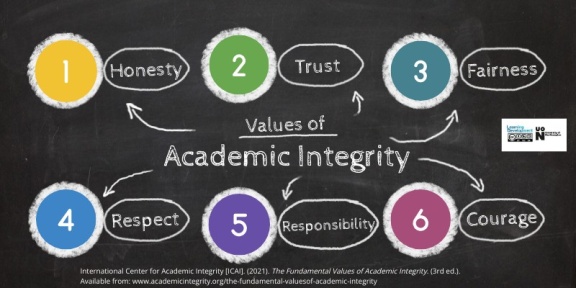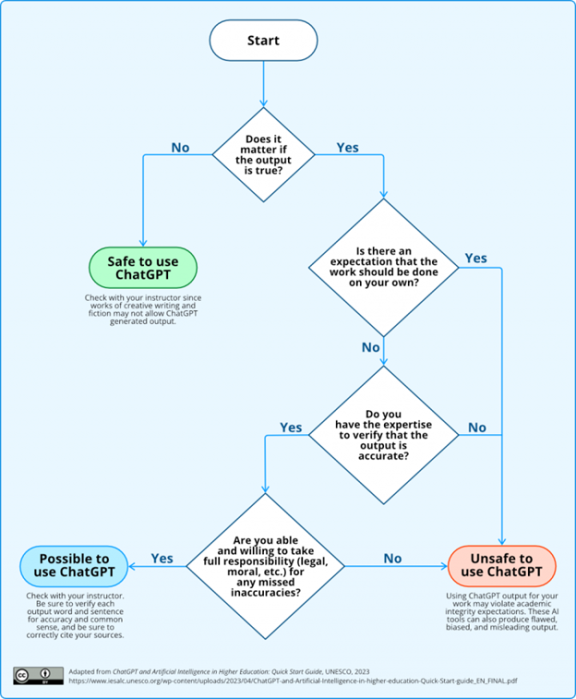Guidelines for Using AI Tools in Academic Assignments:
It can be complicated to decide whether to use AI for assignments. The 2 key points are
- You should never pass off AI generated work as your own (see the citations/acknowledgment information below)
- Your professor has the final say on what uses are allowed, so please consult with them before making use of GenAI tools
If AI is allowed in your class, consider using the below graphic to help you navigate appropriate uses. If it is important that the output is true, the work is your own/original, and you do not have expertise in the area to verify information and take accountability for inaccuracies, it is best not to use GenAI.
Citing AI Tools
Please note that citing is not always the correct way to indicate AI use, also review the below content on writing acknowledgments.
APA
These guidelines suggest describing how you used a GenAI tool, providing the prompt and the relevant output.
In-text Example: (OpenAI, 2024)
Reference List Example: OpenAI. (2024). ChatGPT (Mar 14 Version) [Large language model]. https://chat.openai.com/chat
Link to Guidelines: https://apastyle.apa.org/blog/how-to-cite-chatgpt
MLA
Cite a generative AI whenever you paraphrase, quote or incorporate into your own work any content that was created by it and acknowledge all functional uses of the tool in a note, your text, or another suitable location.
In-text Example: ("Describe the symbolism")
Reference List Example: "Describe the symbolism of the green light in the book The Great Gatsby by F. Scott Fitzgerald" prompt. ChatGPT, 13 Feb. version, OpenAI, 8 Mar. 2023, chat.openai.com/chat
Link to Guidelines: https://style.mla.org/citing-generative-ai/
IEEE
IEEE has not published guidance on how to cite Generative AI tools.
Link to Guidelines: https://journals.ieeeauthorcenter.ieee.org/your-role-in-article-production/ieee-editorial-style-manual/
Vancouver/ICMJE
Referencing AI-generated material as the primary source is not acceptable.
You should either go to the references provided by the AI tool and reference these, or write an acknowledgement statement.
Link to Guidelines: https://www.icmje.org/recommendations/browse/manuscript-preparation/preparing-for-submission.html#g
Chicago
Indicate your use of GenAI in a footnote or endnote, and do not include a citation to GenAI in your bibliography/reference list unless you also include a publicly available link.
In-text Example: "The following recipe for pizza dough was generated by ChatGPT"
Footnote: 1. Text generated by ChatGPT, OpenAI, March 7, 2024, https://chat.openai.com/chat
Link to Guidelines: https://www.chicagomanualofstyle.org/book/ed18/part3/ch14/psec112.html
Acknowledging AI Use
A citation isn't always sufficient to indicate that you've used a GenAI tool. Some of the key reasons to include citations are:
- Citations give credit to the person whose work you have used (but GenAI doesn't meet standard requirements for authorship in most cases, and so you are not giving credit to authors)
- Citations let you (and others) track down the information being discussed (but for most GenAI tools, you can't directly link to its outputs, so the reader can't see exactly what you see)
Therefore, consider using an AI acknowledgement to detail your use.



